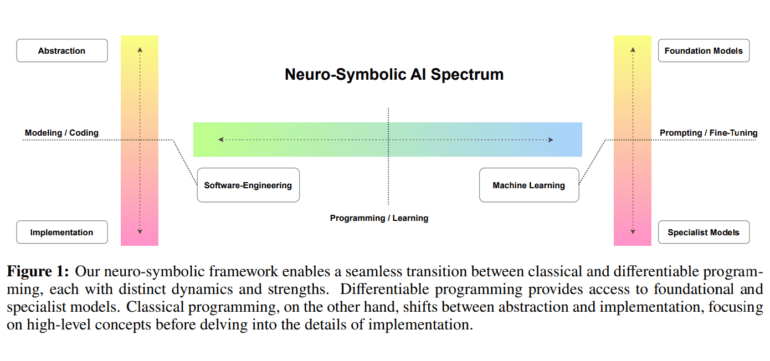TL;DR:
- SymbolicAI integrates generative models and logic-based solvers, enhancing AI capabilities.
- Developed by researchers from Johannes Kepler University and the Austrian Academy of Sciences.
- Combines contextual learning with functional zero- and few-shot operations for adaptable applications.
- Features modular architecture with diverse solvers for tasks like mathematical evaluation and information retrieval.
- Positions language as a core processing module, distinct from other cognitive functions.
- Employs state-of-the-art LLMs as NeSy engine backends for comprehensive evaluation.
- Evaluates logical reasoning capabilities and proficiency in constructing computational graphs.
Main AI News:
The realm of generative AI is witnessing a renaissance, buoyed by the unprecedented success of large language models (LLMs) that exhibit remarkable versatility across diverse domains. These LLMs have revolutionized various tools, empowering functionalities ranging from search-based interactions to program synthesis and conversational interfaces. Moreover, they have streamlined the fusion of multiple modalities, ushering in a new era of capabilities encompassing text-to-code, text-to-3D, text-to-audio, text-to-image, and video processing. Such advancements underscore the profound influence of language-driven interactions on the trajectory of human-computer engagement.
In response to the imperative of aligning value propositions and unlocking novel avenues for interaction paradigms, researchers have embarked on fine-tuning LLMs through reinforcement learning mechanisms informed by human feedback or direct preference optimization. Despite their prowess in formal linguistic domains, recent studies underscore the limitations of LLMs in functional language competency.
Enter SymbolicAI, an innovative compositional neuro-symbolic (NeSy) framework developed by researchers from Johannes Kepler University and the Austrian Academy of Sciences. SymbolicAI transcends conventional boundaries by adeptly representing and manipulating compositional, multi-modal, and self-referential structures. Through contextual learning, this framework augments the creative capacities of LLMs with functional zero- and few-shot learning operations, laying the groundwork for the emergence of adaptable applications. Notably, SymbolicAI orchestrates the generation process with precision, fostering a modular architecture endowed with diverse solvers. These solvers encompass engines for formal language-based mathematical expression evaluation, theorem proving engines, knowledge-storing databases, and information retrieval search engines.
The architects of SymbolicAI envisage domain-agnostic problem-solving mechanisms, conceiving these solvers as foundational elements for constructing compositional functions in computational graphs. This approach engenders an extensible toolkit that seamlessly integrates classical and differentiable programming paradigms. Drawing inspiration from cognitive architectures and insights into the role of language in shaping semantic cognition, the designers position language as a pivotal processing module, distinct from cognitive faculties like reasoning and memory.
In a bid to assess the efficacy of multi-step NeSy generation processes, the researchers introduce a comprehensive benchmarking framework encompassing quality metrics and empirical scoring methodologies. Leveraging state-of-the-art LLMs as NeSy engine backends, they undertake a meticulous evaluation of potential application domains. Their evaluation framework revolves around prominent models such as GPT-3.5 Turbo, GPT-4 Turbo, Gemini-Pro, LlaMA 2 13B, Mistral 7B, and Zephyr 7B, probing their logical reasoning capabilities across mathematical and natural language domains. Additionally, the team scrutinizes the models’ proficiency in conceptualizing, constructing, managing, and executing hierarchical computational graphs.
Conclusion:
The emergence of SymbolicAI represents a significant advancement in the intersection of generative AI and logic-based approaches. This innovation opens up new horizons for AI applications, promising enhanced problem-solving capabilities and more efficient human-computer interactions. As SymbolicAI matures and its capabilities become more widely adopted, we anticipate a transformative impact on various industries, driving innovation and productivity gains in the market.

